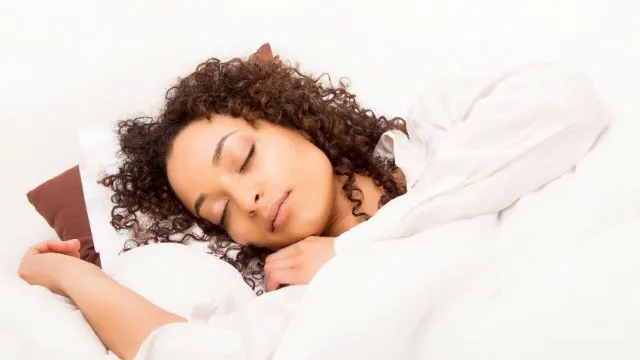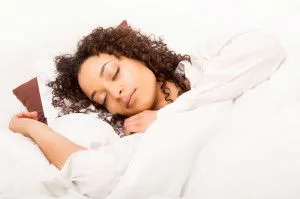
- Share on Facebook36
- Share on Pinterest
- Share on Twitter
When we pull an all-nighter to get a project done, or go for several days with fewer Z’s than normal, can we really set our sleep record straight by getting extra snooze hours over the weekend? According to experts, it is possible to partially redeem lost sleep, but it may not have all of the restorative effects you may expect, especially in the short term.
Sleep deprivation is no laughing matter. Immediately following lack of sleep, you may experience inability to concentrate, memory problems and headaches, as well as impaired vision and driving skills. If insufficient sleep becomes a pattern, it can lead to chronic inflammation, which opens the door for many illnesses, including diabetes and heart disease. It has also been linked to a higher risk of early death.
It is the general consensus among experts that most people need between seven and eight hours of sleep per night, though it may vary depending on genetics, lifestyle and health conditions. Some people can magically feel alright after only six hours, while others are sluggish unless they have nine. However, can a week of six or less hours per night be set right by a weekend of ten per night?
According to Dr. Raghu Reddy of the University of Arkansas for Medical Sciences (UAMS), “yes, people can make up for lost sleep on another day. The amount of sleep lost and recovered may not be the same, though. Most of the first few hours of sleep can be recovered, but if the amount of sleep lost is more than a few hours, not all of it will be recovered.”
Dr. Reddy also points out the body’s natural powers to heal itself, even after lack of sleep takes its toll. He adds, “by nature our bodies try to recover as much of deep sleep and REM sleep that is lost and may forego other stages of sleep.”
A 2013 study by the Pennsylvania State University College of Medicine set out to test the restorative effects that a weekend of sleeping in could really bring. The research team recruited 30 healthy adults to sleep for eight hours per night for the first four nights, six hours for the following six nights, and then ten hours for the last three nights, in a sleep lab setting. The “daytime sleepiness levels,” attention spans, inflammation (measured by the IL-6 biomarker) and cortisol levels of the volunteers were monitored.
Results showed that the daytime sleepiness of the volunteers rose during the sleep restriction period, and then went back to baseline after two nights of recovery sleep. Inflammation also rose during the sleep restriction, and returned to baseline after the recovery.
Notably, cortisol levels in the volunteers stayed the same during the sleep restriction period, but dipped below baseline after the recovery sleep, leading researchers to hypothesize that the volunteers had begun the study in a sleep-deprived state.
The one thing that three days of recovery sleep did not correct was the volunteers’ attention spans. Their levels of attention and focus had “dropped significantly” during the six-hour nights, and did not get better after three nights of recovery sleep.
Study authors concluded, “extended recovery sleep over the weekend reverses the impact of one work week of mild sleep restriction on daytime sleepiness, fatigue, and IL-6 levels, reduces cortisol levels, but does not correct performance deficits.” The researchers were careful to note that these were short term results, and that the effects on focus of long-term recovery sleep were not uncovered by the study.
If you have been burning the candle at both ends and surviving on too little sleep, the key is to get back into a natural sleep pattern on a regular basis. Dr. Lawrence J. Epstein, medical director of Sleep HealthCenters, recommends a few months of taking it easy and catching up on sleep for chronically sleep deprived people. When this just isn’t possible with your schedule, even adding an extra hour (or preferably, two hours) to your night’s sleep can be beneficial, especially over the long term.
 In the words of Stanford University Sleep Clinic founder, William C. Dement, “when you put away sleep debt, you become superhuman.” So, if your body is craving sleep, do whatever you can to get to bed at least an hour earlier on a regular basis, instead of trying to compensate over a weekend. While “sleep cramming” does have benefits, they pale in comparison to a healthy, routinized sleep schedule.
In the words of Stanford University Sleep Clinic founder, William C. Dement, “when you put away sleep debt, you become superhuman.” So, if your body is craving sleep, do whatever you can to get to bed at least an hour earlier on a regular basis, instead of trying to compensate over a weekend. While “sleep cramming” does have benefits, they pale in comparison to a healthy, routinized sleep schedule.
-The Alternative Daily
Sources:
http://www.psychologytoday.com/blog/sleep-newzzz/201311/can-you-ever-really-catch-sleep
http://www.ncbi.nlm.nih.gov/pubmed/23941878
http://www.scientificamerican.com/article/fact-or-fiction-can-you-catch-up-on-sleep/
http://www.uamshealth.com/?id=11491&sid=1
- Share on Facebook36
- Share on Pinterest
- Share on Twitter

